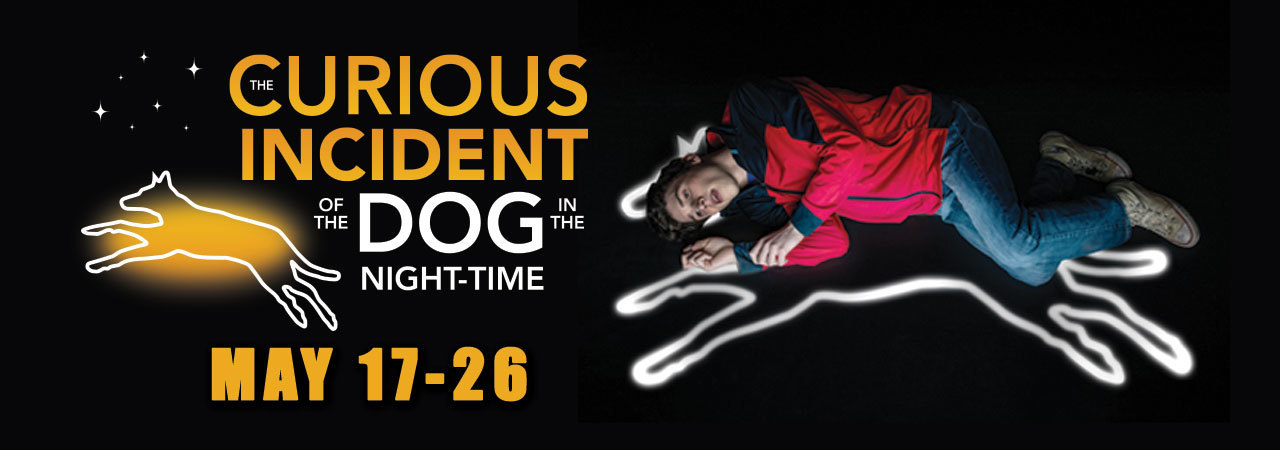Review: THE CURIOUS INCIDENT OF THE DOG IN THE NIGHT-TIME at Theatre Tulsa

A great play can serve as a window into a character's mind, and that window helps audiences develop a deeper understanding of what it would be like to inhabit the world as someone else. Theatre Tulsa's production of The Curious Incident of the Dog in the Night-Time provides a unique opportunity to peer into the mind of an exceptional person and emerge with a heightened sense of compassion and affinity for anyone who experiences life a little differently.
"Curious Incident" was adapted by the prolific Simon Stephens from the 2003 bestselling novel of the same name by Mark Haddon. It tells the story of a British 15 year-old named Christopher who struggles to navigate everyday life and his parents' disintegrating marriage through the lens of his singular psyche. While the word "autism" is never used in the play, many of Christopher's behaviors and emotional experiences fit with ASD symptoms (last Sunday's performance was followed by an illuminating talk-back with Autism Tulsa, in which local experts attested to this alignment). Most notably, Christopher has a difficult time with reading body language and interpreting figurative expressions, like metaphors. He says, "I think [a metaphor] should be called a lie because a pig is not like a day and people do not have skeletons in their cupboards."
The 2013 play has a short but illustrious history. The original run in the U.K. won seven Olivier Awards including Best New Play, and it was also an acclaimed success in the U.S., where it continued to rack up awards including the Tony for Best Play. The West End and Broadway productions had something crucial in common: they both used the on stage magic of lighting design to heighten the intensity of Christopher's impressions of the world. Both used fantastically immersive lights and sound to saturate the theatrical space and submerge the audience in Christopher's electrified consciousness.
Theatre Tulsa chose to do things a little differently. Their pared-down rendition of the play couldn't be more different from the notoriously lavish and overstimulating West End and Broadway productions, and this put the onus on the cast to authentically depict Christopher's inner life without all of the bells and whistles. The result was a production that was all the more affecting for relying on incredible performances and allowing the technical embellishments to take a backseat to the text itself.
Theatre Tulsa's straightforward approach was apparent from the start of the play, which begins with the titular dog: he is found dead in a neighbor's yard (much to Christopher's chagrin) and is represented in full furry plushness, stabbed thoroughly with a lifesize garden fork. The starkly literal scenic accents and props in the play serve as a fitting counterpoint to the whimsical space conjured by Christopher's diary, which is read aloud as a kind of narration and serves as the central plot driver. Ironically enough, this diary feels abstract and fantastical because it is in fact so literal as to be removed from everyday experience.
Real-life teenager Knox Blakely as Christopher does the heavy lifting of letting the audience inside the world of his character. His performance was stunningly authentic: where other young actors might have struggled with embodying Christopher's vulnerability and emotional extremes, Blakely positively thrived. Instead of blowing up into a caricature or shying away, he instead leaned in to these opportunities for honesty with the grace of a seasoned performer. It is truly a joy to watch him work.
Other performers include Jeff Huston as Ed and Kristin D. Robert as Judy, Christopher's parents, as well as the radiant Karlena Riggs as Siobhan, Christopher's teacher (a role that fit her like a glove, considering that her day job is in Special Education). Huston and Robert capture the excruciating lack of preparedness that comes with parenting children of all abilities, while simultaneously inspiring empathy even in their characters' most inept moments. The play's 6-person company flesh out the cast of characters in Christopher's life, including his neighbors, community members, and strangers on the underground. The Liddy Doenges Theatre provided a simultaneous intimacy and boundless potential for interpreting the space, and director Daivd Blakely (incidentally, father to the younger Mr. Blakely) astutely utilized his cast rather than technical tricks to transform the stage into the wide variety of settings in the play.
Readers of Mark Haddon's novel might find it difficult to fully imagine how a play could capture the starkness and inwardness of the book, and yet playwright Simon Stephens somehow manages to pull it off. Theatre Tulsa and Blakely - both father and son - clearly realized that the most powerful thing about "Curious Incident" is how the exploration of Christopher's extraordinary mind highlights universal experiences of interpreting and coping with overwhelming experiences. And while this production does include an adorable puppy, and even a 3-dimensional demonstration of an algebra problem, the focus in Theatre Tulsa's "Curious Incident" is on doing the detective work of getting to know an exceptional person, and that's what makes it a truly valuable piece of theatre.
Reader Reviews

Videos

